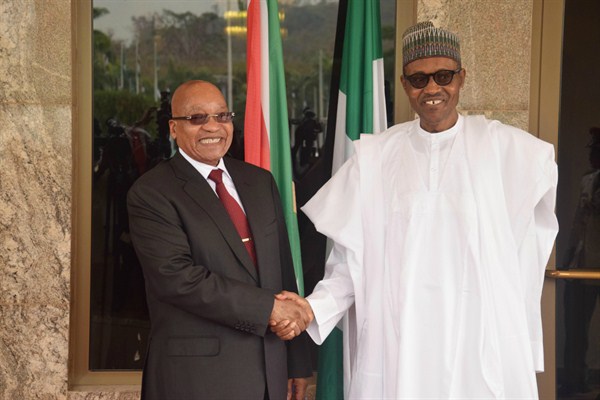South African President Jacob Zuma’s two-day trip to Nigeria earlier this month was the first step in a campaign to first stabilize and then hopefully radically improve relations between Africa’s two anchor states. Analysts have been lamenting for some time the degree to which this pivotal relationship has been allowed to deteriorate. Poor relations have been detrimental to African unity, the cohesion and purpose of the African Union, and the promotion of the wider African agenda of development, conflict management and democratization. What’s behind this overdue diplomatic outreach, and what are the prospects for a lasting rapprochement?
Since 2009, the relationship between South Africa and Nigeria has been deeply troubled, a situation exacerbated by the absence of any serious attempt to build a sustained diplomatic dialogue to help bridge their numerous differences. Zuma’s Nigeria visit confirmed that both sides now understand that this decline must be reversed. A relationship so crucial to each country’s well being—and to the wider continent’s—cannot be allowed to fester indefinitely in an atmosphere of resentment and recrimination. Zuma took a high-level Cabinet and business delegation to Nigeria with him, sending a clear signal of South Africa’s commitment to a new beginning. Nigeria, for its part, recognized the importance of the visit, too, as evidenced by the invitation to Zuma to address a joint session of the Nigerian parliament—the first leader to do so since U.S. President Bill Clinton in 2000.
A number of factors coalesced to make this the right moment to stabilize ties. For one, both states face difficult economic situations. Nigeria’s economy has been hit hard by the sharp fall in global oil prices, which has reduced its growth rate to 3.3 percent and served as a reminder that this is still essentially a single-product economy. South Africa’s underperforming economy, characterized by lethargic growth rates—1.3 percent in 2015—and alarmingly high levels of unemployment, has been in trouble for a while.

